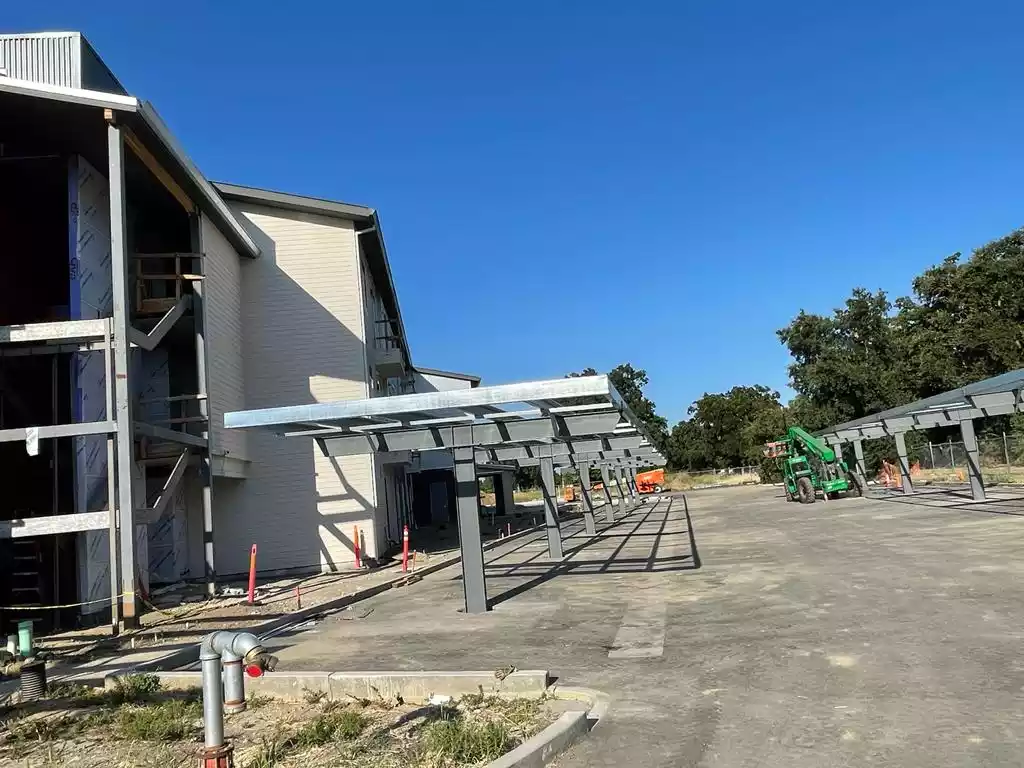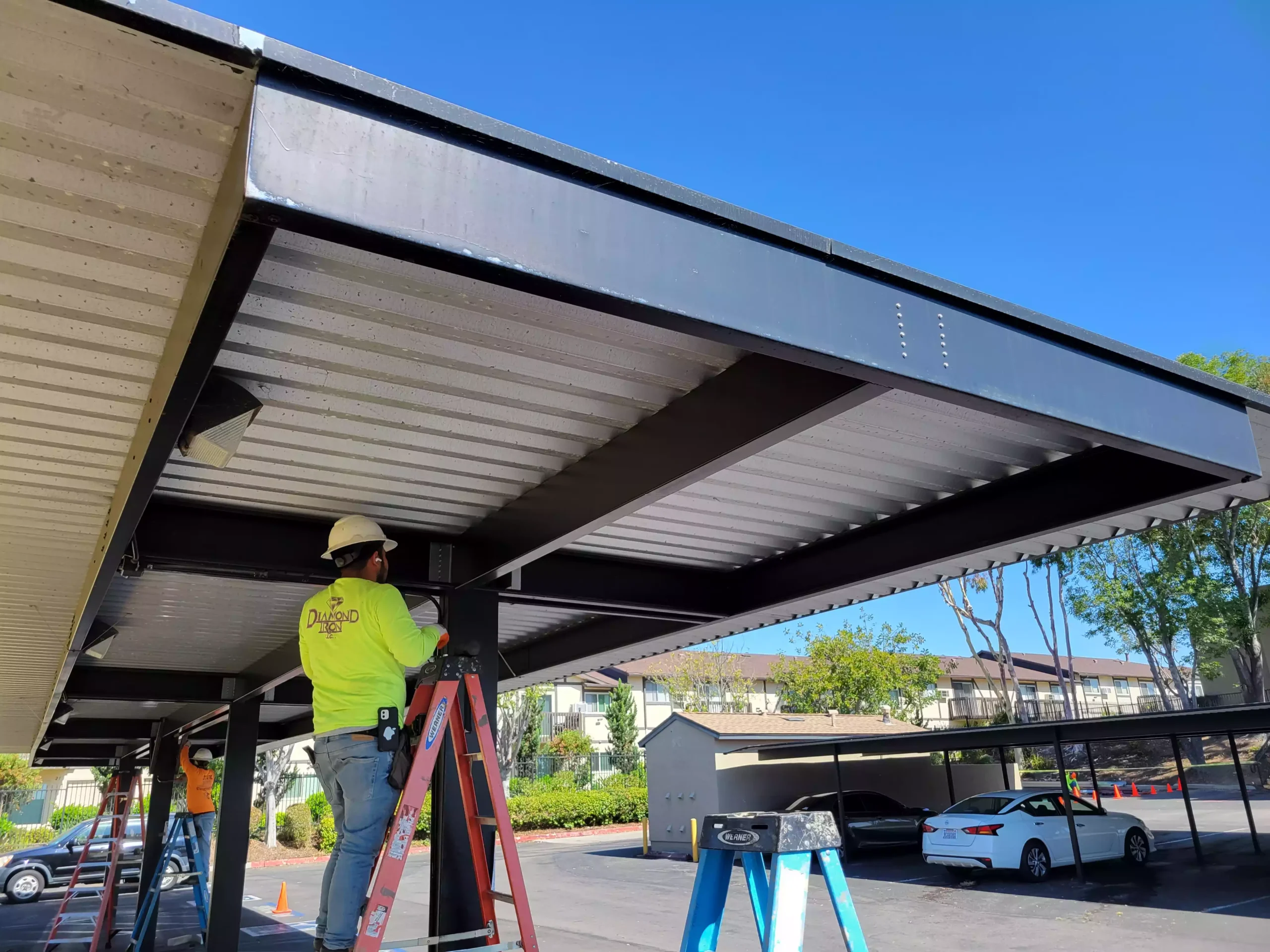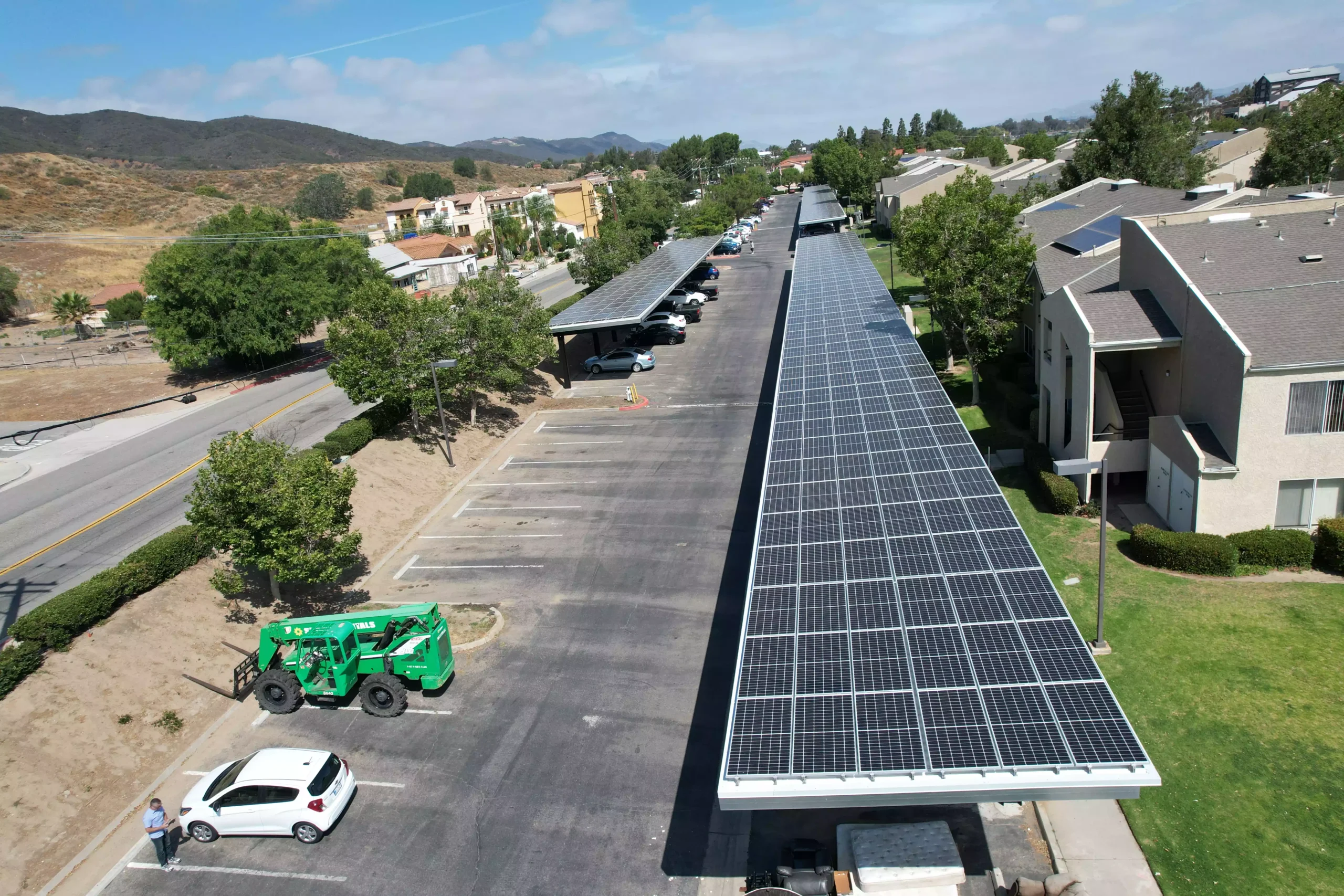If rooftop solar is not your choice, why not park those rays right above your car?
A residential solar carport does not just protect your ride from the elements—it is a powerhouse in disguise! These setups are not only flexible but also best at cutting both your energy bills and carbon footprint.
What’s the deal with a residential solar carport’s cost and performance compared to the typical rooftop setup?
We are getting into how these smart structures work and what benefits you get for your buck. Also, we will look at the extras you can integrate, making your carport more than just a parking spot but a feature-packed, eco-friendly hub.
How Residential Solar Carports Work
Getting solar energy through renewable solar electricity gets a double punch. However, the real trick lies in finding the ideal spot and sufficient space to set up those solar panels.
Get into the best solution for residential solar carports! These structures not only protect your car from harsh elements but also serve as a cost-effective way to improve your home’s energy efficiency by maximizing solar energy capture.
Are you building a solar carport? It is pretty straightforward—think of it as your regular carport, but with a change: Install some sturdy solar panels.
Join them up to a portable power station! You are now powering up various home appliances with clean energy. This setup not only helps reduce your electricity bills but also decreases your carbon footprint.
Residential Solar Carport Cost
Typically, residential solar carports cost less than their commercial siblings. Smaller size means they are simpler to construct. Prices for these eco-friendly shelters range from $11,400 to $25,000. However, they are a bit pricier than standard solar setups.
Several factors influence the price tag of solar carports:
Solar Carport Cost Breakdown:
- Type of solar panel
- Number of modules
- Output capacity
- Optional battery
- Optional EV charging unit
- Installation fees
The total expense depends on the structure’s dimensions and the solar system size. Clearly, equipment quality and local installation rates also play a role.
Installation & Requirements
It is important to leave solar carport setups to the experts. Why? Well, they come packed with gear like EV chargers and solar panels, which are no toys for the inexpert! The cool part? As solar carports gain fame, a growing squad of trusted installers is showing up. Yes, most solar outfits can tackle a carport project, so do not worry.
What’s on the Solar Carport Menu?
- How many carports we are talking about
- EV charger hook-up (only if you are into that)
- Battery storage
- The setup effort (and your wallet’s pain) changes depending on your carport’s blueprint. Say you want to add an EV charging station; that is going to need extra elbow grease for wiring and mounting, right?
It is smart to check out your installer’s experience and credentials to make sure they are up to scratch—nobody likes a half-baked job, right?
What Are the Benefits of a Residential Solar Carport
The following are some advantages of a residential solar carport:
1. Optimized Orientation and Positioning of Panels
Installing solar panels on your roof is pretty standard, but let’s be real—most homes were not designed with solar optimization in mind.
Now, your residential solar shade structures? Those can be set up perfectly to max out your solar power. So, why not let your carport do the heavy lifting in consuming those rays?
2. Charging Electric Vehicles (EVs)
Solar carports are a real win for electric vehicle (EV) enthusiasts. They not only catch you a spot to park and power up, but they are also winners of cutting carbon footprints. Avoiding gasoline and coal for the sun means you are driving clean without even trying.
Juicing up your EV under a solar carport usually costs less than pulling power from the grid or public pumps. Also, while grid prices might climb, solar energy keeps on shining for free and not using those panels. Do not worry—send extra energy back to your house or into the grid and watch the energy credits come in.
3. Easier Maintenance
Maintaining your solar panels becomes easy with a solar carport setup—no more clambering onto roofs! This smart choice not only makes access simpler but also helps keep your panels looking top-notch.
Did you know that ground-mounted solar systems, including carports, can be up to 10% more efficient due to easier cooling and cleaning? Going for a solar carport is like choosing sneakers over high heels for a hike; it just makes sense!
Are Residential Solar Carports Eligible for Solar Tax Credits
Pricing for a solar carport changes based on your panel picks, whether you opt for custom builds over ready-made frames, and your power production goals. Typically, a 5kWh setup might set you back $18,000 to $25,000.
Sounds steep? But do not worry about it—there is a silver lining! You could catch some federal or state refunds to cut those costs. Likewise, loads of solar companies are talking about flexible payment plans, making them easier to handle financially.
Federal Incentives
Did you know you can have a lovely deal on your taxes just by going green? Yes, the Federal Solar Tax Credit lets you chop a huge 30% off your solar installation costs right on your federal tax return. And guess what? It does not just stop this year; it keeps on giving year after year!
Back in August 2022, the Inflation Reduction Act decided to slow down the phase-out of these solar savings. So, homeowners like you have got a nice stretch to cash in on this deal. :
- From now until 2032, you can save 30% of the cost of installing your solar system.
- Come 2033, it drops a bit to 26%, and
- By 2034, it is down to 22%.
- By 2035, it is time to say bye-bye to the savings—phased out.
What Size Should Your Residential Solar Carport Be
Figuring out the perfect dimensions for your solar carport is not just about covering your cars; it is about maximizing your energy competition, too. How many cars do you want to park? Do you dream of powering your home with the sun?
You can determine the ideal size by weighing the installation costs, your available space, and the kilowatts you aim to generate.
Typically, a run-of-the-mill carport is 12ft by 20ft or about 3.65m x 6m. Stick with these dimensions as your baseline, and you will be off to a sunny start!
FAQs
What is a residential solar PV system?
A residential solar PV system harnesses sunlight using PV cells, which convert solar energy into electricity. It is a clean, efficient way to power your home directly from the sun.
What is the difference between commercial and residential solar panels?
Residential solar panels usually feature 72 cells and measure 65 inches by 39 inches. In contrast, commercial solar panels are larger, containing 96 cells and measuring 78 inches by 39 inches.
Are all residential solar panels the same size?
Yes, the dimensions of residential solar panels are generally standardized across the board for consistency in household installations.
How many solar panels are needed to run a 2000 sq ft house?
To power a 2000 sq ft house, you would typically need between 12 to 18 solar panels, depending on your energy usage and sunlight exposure.
Conclusion
Residential solar carports are not just about keeping your car cool and dry; they are a top choice for your wallet and the planet.
Imagine cutting your energy bills while parking under a structure that fights climate change by churning out clean energy. Also, you are stepping closer to a net-zero carbon lifestyle—how cool is that?



